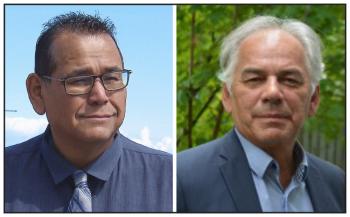Image Caption
Summary
Local Journalism Initiative Reporter
Windspeaker.com
A recent finding by the Canadian Human Rights Tribunal that Mashteuiatsh Police Services received inadequate funding due to discrimination could have an impact on the federal First Nations Policing Program right across the country.
“The decision by the Canadian Human Rights Tribunal (CHRT) comes to the same conclusion that we as First Nations have presented so many times over. It confirms that governments have totally failed in providing the necessary funding to sustain our policing services within our First Nations communities,” said Ghislain Picard, chief for the Assembly of First Nations Quebec-Labrador (AFNQL).
The First Nations Policing Program is a tripartite program that sees policing agreements signed between the federal government, provincial or territorial governments, and First Nations. The federal government covers 52 per cent of the cost. The province or territory picks up the remainder.
Currently the program serves approximately 60 per cent of First Nation and Inuit communities in Canada.
“I think the decision could have the potential of impacting all (First Nations) police services across the country,” said Picard.
Picard was joined in a Zoom news conference on Feb. 3 by Pekuakamiulnuatsh First Nation Chief Gilbert Dominique, who brought the complaint to the CHRT in 2016, and Kebaowek First Nation Chief Lance Haymond, who holds the public safety portfolio for the AFNQL.
Dominique filed the complaint against Public Safety Canada stating the policing program had provided insufficient funding to adequately service the community of Mashteuiatsh in the Saguenay-Lac-Saint-Jean region. Pekuakamiulnuatsh First Nation is located in that region. He alleged the community “suffered unfavourable treatment” because of discrimination based on race.
Mashteuiatsh has had a tripartite agreement with the federal and Quebec governments since 1996. It has renewed that agreement at irregular intervals ranging from one year to the present five-year agreement, which expires in 2023.
Dominque stated in his complaint that the adverse treatment was as a result of the program receiving insufficient funding, the agreement having to be renewed after short periods of time, and an inadequate level of police services offered to members in the community.
In its Jan. 31, 2022, ruling, the CHRT concluded Dominique’s complaint was founded.
The CHRT’s decision points out that Public Safety Canada conceded that the services offered to the First Nations through the program would be influenced by the funding that is paid to them.
However, Public Safety Canada argued that Mashteuiatsh had not suffered unfavourable treatment in connection with the services provided.
The CHRT did not agree.
The CHRT drew on its 2016 decision of a complaint brought by the First Nations Child and Family Caring Society, which held that the federal government had discriminated against First Nations children involved in child welfare by underfunding services it provided them.
The CHRT said funding for the First Nations Child and Family Services Program constituted a service and the federal government’s role was not limited to funding the service. The same, said CHRT, was the case for the First Nations Policing Program as Public Safety Canada not only provided funding, but also provided oversight, assistance and demanded accountability, stating in its policy that its objectives were “improvement of social order, public security and personal safety in First Nations communities.”
The CHRT pointed to evidence that indicated the federal government is first to establish its level of contribution to the program.
The CHRT also pointed out that Mashteuiatsh asked for more funding for its police services to meet the needs of the community. The federal and Quebec governments refused to increase their contributions.
The complainant argues that police services must be comparable to those of neighbouring municipalities, stated the CHRT.
Picard said the shortcomings of the policing program has been a concern raised with the federal government for years. He recalled “going to the Hill” in Ottawa in 2011 and 2013 to make the same arguments Mashteuiatsh had.
“I remember under the Harper government back in 2013, the (public safety) minister at the time, Minister (Victor) Toews had agreed, had listened to us, met with us and the only action he took was to renew the program, which was a total failure,” said Picard.
While the CHRT has rendered its decision, it has not made a judgement on compensation or reparation.
Those discussions will occur between Mashteuiatsh and Canada, said AFNQL legal counsel Benoit Amyot.
“If we cannot agree on compensation or reparation, we could receive an order from (the) tribunal and that would be binding,” said Amyot.
Picard said he was confident Canada and Quebec were discussing the matter as the news conference was being held. However, he was not as confident that an agreement on compensation or reparations would be forthcoming quickly.
He pointed to the CHRT’s ruling in the Caring Society’s case. An agreement was only reached with the federal government for compensation this past Christmas.
“It’s going to take a long time,” said Picard.
The CHRT did not set a deadline as to when the issue of reparation had to be met.
“Protection and safety should be a very fundamental and basic human right and why should it be different when it comes to our peoples? I think that’s the point to be made here and that’s the point that needs to be understood by governments,” said Picard.
The Prime Minister’s mandate letter that went to Public Safety Minister Marco Mendicino, stated, “With the Minister of Indigenous Services, co-develop a legislative framework for First Nations policing, which recognizes First Nations policing as an essential service, and work with interested communities to expand the number of communities served by First Nations policing.”
Local Journalism Initiative Reporters are supported by a financial contribution made by the Government of Canada.

